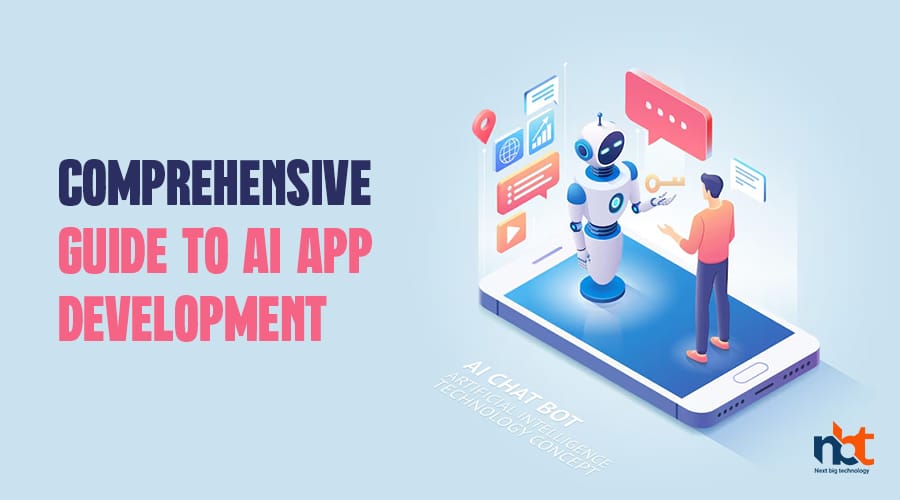Artificial Intelligence (AI) has changed the game in mobile app development. It now changes how businesses talk to customers and makes things more efficient. This guide takes you deep into the world of AI app development. It covers the perks of AI apps, how to make them, the tools you need, and how to use them well. It’s perfect for both experienced developers and entrepreneurs wanting to use AI’s power.
Table of Contents
Key Takeaways
- Learn the basics and benefits of AI app development.
- See the steps to make an AI app, from starting to training the model.
- Find out about the tools and frameworks for AI apps.
- Get tips on adding AI to apps and best practices for AI app making.
- Explore how AI is used in different industries and the latest trends.
- Understand the costs, benefits, and how to build a good team for AI apps.
- Find resources and learning chances to improve your AI app skills.
Understanding AI App Development
AI app development is changing the game in the digital world. It’s making mobile and web apps smarter and more useful. AI app development means making apps that use AI to make things better for users, automate tasks, and give smart insights.
What is AI App Development?
It’s about adding AI features to apps for mobile or web. This includes things like understanding language, seeing images, predicting trends, and learning from data. With AI, apps can get to know what users like, suggest things they might want, and do things on their own. This makes apps better and more helpful.
Benefits of AI-powered Applications
Using AI-powered applications has lots of perks for users and companies. Here are some main benefits:
- Improved decision-making: AI apps can look at a lot of data and give smart advice, helping users make better choices.
- Personalized user experiences: AI can figure out what users like and give them what they want, making things more fun and relevant.
- Increased efficiency: AI can automate boring tasks and make workflows smarter, saving time and money.
- Predictive capabilities: AI apps can use past data and learn to guess what users might need next, solving problems before they start.
By using AI app development, companies and developers can make apps that are smart, fun, and focused on what users want. This can lead to more growth and success online.
“The future of app development lies in the seamless integration of artificial intelligence, empowering users with intelligent and personalized experiences.”
AI App Development Process
The development of AI-powered apps has a clear process with key stages. At the center is the AI app development process. This method makes sure AI works well in the app.
Requirements Gathering and Analysis
The first step is requirements gathering and analysis. Here, we deeply understand the problem, who will use it, and what it should do. Good planning and research here are key. They make sure the AI fits the project’s goals.
AI Model Selection and Training
After understanding the needs, we pick and train the right AI models. We look at different AI methods like machine learning and natural language processing. Then, we train the chosen models with data to make them work better in the app.
| AI App Development Phase | Key Activities |
|---|---|
| Requirements Gathering and Analysis |
|
| AI Model Selection and Training |
|
By following these steps in the AI app development process, developers can make sure AI works well in the app. This leads to a smooth and smart experience for users.
AI App Development Tools and Frameworks
Creating AI apps needs special tools and frameworks. Developers have many options, each with unique features. From TensorFlow, PyTorch, and Amazon SageMaker to low-code AI platforms and cloud services, the options keep growing.
TensorFlow, made by Google, is a top machine learning framework. It has tools, libraries, and resources for making and using machine learning models. PyTorch, from Facebook’s AI Research, offers a simpler way to do deep learning.
Cloud services like Amazon Web Services (AWS), Microsoft Azure, and Google Cloud provide AI tools and services. They include Amazon SageMaker for training and using models, Azure Cognitive Services for adding AI to apps, and Google Cloud AI Platform for managing machine learning models.
There are also low-code/no-code AI platforms like Appian, Mendix, and OutSystems. These let developers make AI apps without needing to code a lot. They have pre-built AI parts and easy interfaces for adding AI to apps.
| AI App Development Tool/Framework | Description |
|---|---|
| TensorFlow | Open-source machine learning framework developed by Google |
| PyTorch | Open-source machine learning framework developed by Facebook’s AI Research lab |
| Amazon SageMaker | AWS service for building, training, and deploying machine learning models |
| Azure Cognitive Services | Microsoft’s suite of pre-built AI services for incorporating AI capabilities into applications |
| Google Cloud AI Platform | Google’s platform for building, deploying, and managing machine learning models |
| Appian | Low-code/no-code AI development platform |
| Mendix | Low-code/no-code AI development platform |
| OutSystems | Low-code/no-code AI development platform |
Using these AI app development tools and AI app development frameworks, developers can make AI apps faster and more efficiently. They can bring new solutions to market quicker, using AI’s power.
AI App Development: Custom AI App Development, AI Software Development
Organizations can choose from custom AI app development or AI software development. These options let them make AI solutions that fit their specific needs or add AI to their current systems.
Custom AI app development means making unique AI apps for a company’s special needs. This way, businesses can use AI in a focused way. It makes sure the solution meets their goals and how they work.
AI software development is about adding AI to current software. This makes existing apps smarter and more automated. It helps companies work better, make decisions faster, and be more accurate.
| Feature | Custom AI App Development | AI Software Development |
|---|---|---|
| Tailored Solution | ✓ | – |
| Integration with Existing Systems | – | ✓ |
| Specialized AI Capabilities | ✓ | ✓ |
| Flexibility and Scalability | ✓ | ✓ |
Both custom AI app development and AI software development help organizations use AI in ways that fit their needs. By looking at their needs, companies can pick the best way to innovate and stay ahead.
Integrating AI into Existing Applications
Businesses looking to boost their apps can add AI through APIs and SDKs from AI services and cloud providers. This method lets them add new features without starting from zero. It saves time and cuts costs.
APIs and SDKs for AI Integration
Adding AI to apps is easy with pre-made integrating AI into apps APIs and SDKs. These tools bring AI features like:
- Machine learning for predictive analytics and data-driven decisions
- AI integration APIs and SDKs for natural language processing and chatbots
- Computer vision and image recognition
- Speech recognition and text-to-speech
Using integrating AI into apps APIs and SDKs, businesses can quickly add smart features. This improves the user experience and boosts innovation.
| AI Integration Platform | Key Features | Pricing Model |
|---|---|---|
| Amazon Web Services (AWS) AI Services | Machine learning, natural language processing, computer vision, and speech recognition | Pay-as-you-go, with free tiers available |
| Google Cloud AI Platform | Comprehensive AI and machine learning services, including vision, language, and structured data | Pay-as-you-go, with free trial and credit offers |
| Microsoft Azure Cognitive Services | AI-powered features for vision, language, speech, and decision-making | Pay-as-you-go, with free trial and discounts for long-term use |
By using integrating AI into apps APIs and SDKs, businesses can make their apps smarter. This opens up new chances and keeps them ahead in an AI-filled world.
“Embracing AI-powered features can transform an ordinary application into an intelligent, user-friendly, and data-driven tool that delivers significant value to customers.”
AI App Development Best Practices
Creating successful AI apps means following best practices. These include strong data management, strict privacy and security, and clear AI decision-making. By focusing on these areas, companies can make AI apps that are trusted and ethical. They also provide real value to users.
Data Management and Privacy Considerations
Good data management is key to AI app success. It means collecting, storing, and processing data safely and legally. This means having strong data rules, keeping data quality high, and following laws like GDPR and HIPAA.
To keep users trusting and follow privacy laws, AI app makers must protect sensitive info. This means using strong data encryption, controlling who sees the data, and getting user okay for data use. It’s also important to be clear about how AI makes decisions. This helps users see how their data is used and why the AI gives certain recommendations or predictions.
| Best Practices for AI App Development | Benefits |
|---|---|
| Robust data management strategies | Ensures data integrity, security, and compliance |
| Rigorous privacy and security measures | Builds user trust and protects sensitive information |
| Transparent AI decision-making processes | Enhances transparency and accountability |
Following these AI app development best practices helps make AI apps that are not just advanced but also ethical and trustworthy.
AI App Development Challenges and Solutions
Creating AI apps comes with many challenges, like finding enough good data and making sure the AI works well with old systems. But, by solving these problems and using known solutions, companies can beat these hurdles. This lets them use AI’s power to its fullest.
Data Challenges and Solutions
Getting enough good data is a big issue in AI app making. AI needs lots of quality data to work right. Companies might struggle with not having enough data, or having it in different formats. To fix this, companies can use strategies like combining data, cleaning it, and adding more to it. This makes a strong and dependable data base.
Model Performance and Accuracy
It’s key that AI models are accurate and reliable for AI apps to succeed. Things like how complex the model is, the quality of its training data, and how it changes over time can affect its performance. To solve this, teams of experts and data scientists work together. They tweak and improve the AI models for the best results.
Integration with Legacy Systems
Adding AI apps to old systems can be tough because they might not work well together. To fix this, companies can use a modular way. They use APIs and small services to make sure the AI app and old systems can talk and share data easily.
Ethical Considerations
As AI apps get more common, we have to think more about things like privacy, bias in algorithms, and being open. To deal with these issues, we need strong rules and checks. This makes sure AI is used in a way that’s right and fair.
By solving these problems with good solutions and working with experts, companies can make the most of AI apps. This leads to new ideas and changes in many areas.
| AI App Development Challenges | Solutions |
|---|---|
| Data Availability and Quality | Data integration, cleansing, and augmentation |
| Model Performance and Accuracy | Collaborative approach with domain experts |
| Integration with Legacy Systems | Modular approach using APIs and microservices |
| Ethical Considerations | Robust governance frameworks and policies |
AI App Development for Specific Industries
AI-powered apps are changing many industries, bringing big benefits and new ideas. Healthcare and retail are two areas that have seen a big impact from AI app development.
Healthcare AI App Development
In healthcare, AI is changing how doctors diagnose, treat, and care for patients. Healthcare AI app development helps with many tasks, like:
- Medical image analysis: AI looks at medical scans to spot diseases early.
- Disease prediction: AI uses patient info to predict disease risks, helping with early treatment.
- Personalized treatment recommendations: AI creates treatment plans based on a patient’s needs.
Retail AI App Development
Retail has also seen the benefits of AI, changing how customers shop and how stores run. AI app development for retail helps with things like:
- Intelligent product recommendations: AI suggests products based on what customers like.
- Automated customer service: AI chatbots offer quick, personal help to customers.
- Optimized supply chain management: AI helps manage inventory and improve supply chain efficiency.
By using AI, healthcare and retail can make things run smoother, improve customer experiences, and stay ahead in their fields.
Emerging Trends in AI App Development
The world of AI app development is changing fast. New technologies and ways of doing things are coming up quickly. Businesses see AI as a big chance to change the game. They’re watching as new trends shape the future of AI apps.
Low-code and no-code AI development platforms are getting popular. These tools let developers and non-tech people make AI apps easily. This makes AI more open to everyone, not just experts.
Edge computing and federated learning are also on the rise. They help keep AI safe and private by processing data locally. This means less data is sent around, making it harder for hackers to get to it.
Natural language processing (NLP) and computer vision are becoming key in AI apps. These features let apps understand and talk to users better. This opens up new ways for many industries to improve.
There’s a big push for responsible AI. Developers are focusing on making AI apps clear, fair, and right for society. This shows how important it is to think about the impact of AI on us all.
These trends are changing the AI app world. They’re bringing new ideas, better user experiences, and tackling big ethical questions.
AI App Development Case Studies
Looking at AI app development case studies gives us insights into how AI helps solve complex problems. These examples show how different companies use AI to make things better for users and transform their businesses.
A top healthcare provider used an AI chatbot to help patients. It scheduled appointments, answered medical questions, and gave health tips. Thanks to its smart language skills, patients were happier, and customer service got easier.
In retail, a big online store used AI to suggest products to customers. It looked at what customers bought and what they looked at. This made more people buy more things, showing how AI can change the game for customers.
| Industry | AI App Development Case Study | Key Outcomes |
|---|---|---|
| Healthcare | AI-driven chatbot for patient support | Improved patient satisfaction, reduced customer service workload |
| Retail | AI-powered product recommendation system | Increased conversion rates and average order value |
These AI app development case studies show how AI changes things in many areas. By looking at these examples, companies can learn how to use AI to make things better and see the real benefits it brings.
“AI-powered applications have the potential to revolutionize how we interact with technology and solve complex problems. These case studies demonstrate the tangible impact AI can have on improving business outcomes and enhancing the user experience.”
AI App Development Resources and Learning
For those wanting to dive into AI app development, many resources are available. You can find online tutorials, educational platforms, and industry publications. There are also developer communities and training programs. These cover the newest tools, frameworks, and best practices in AI.
Online Learning Platforms
Udemy, Coursera, and edX are great places to start learning about AI app development. They offer courses for all levels, from beginners to experts. You’ll get video lectures, coding exercises, and projects to practice with.
Industry Publications and Blogs
Readers can turn to TechCrunch, Venture Beat, and Towards Data Science for the latest in AI app development. These sources share trends and best practices. They keep developers informed about AI technologies and their uses.
Developer Communities
Communities like GitHub, Stack Overflow, and Reddit’s r/artificial intelligence subreddit are perfect for AI app development fans. Here, you can share knowledge, work on projects, and get advice from experts.
| Resource Type | Examples |
|---|---|
| Online Learning Platforms | Udemy, Coursera, edX |
| Industry Publications and Blogs | TechCrunch, Venture Beat, Towards Data Science |
| Developer Communities | GitHub, Stack Overflow, r/artificial intelligence |
Using these AI app development resources and keeping up with AI app development learning helps developers and organizations. They can lead the way and use AI to its fullest in applications.
AI App Development Costs and ROI
Investing in AI apps can be smart for companies, but knowing the costs and ROI is key. The costs change a lot based on the app’s complexity, how much AI is used, the tools picked, and the team size.
But, the good things AI apps bring can make the cost worth it. Companies that use AI well can work better, make more money, and stand out from the competition. AI helps automate tasks, make sense of data, and give customers what they want.
| Cost Factors | Potential ROI |
|---|---|
|
|
By looking at the costs and ROI of AI app development, companies can make smart choices. This helps them use AI’s power in their apps.
“Investing in AI is not just about the technology – it’s about the strategic vision and the ability to unlock the true potential of your data.”
Hiring an AI App Development Team
Creating a top-notch AI app development team means picking the right people with the right skills. You’ll need data scientists, machine learning engineers, software developers, and experts in specific areas. They should work well together to make AI apps that help your business goals.
When hiring an AI app development team, think about these important points:
- Check the team’s tech skills: Make sure they know about data analysis, machine learning, software engineering, and how to put systems together.
- Get a team with diverse skills: Mix technical skills with knowledge from different fields. This ensures a complete approach to making AI apps.
- Focus on teamwork and communication: Good teamwork and clear talking are key for AI projects to succeed.
- Use agile methods: Choose agile development to work in steps, get feedback often, and quickly adjust to new needs.
- Support ongoing learning: Give your team chances to learn about the newest AI tech, tools, and best ways to work.
By picking and supporting a skilled AI app development team, companies can make the most of AI apps. This leads to more innovation, better customer experiences, and reaching business goals.
| Skill | Importance |
|---|---|
| Data Science | High |
| Machine Learning | High |
| Software Engineering | High |
| Domain Expertise | Medium |
| Collaboration | High |
Conclusion
In this guide, we’ve dived into the exciting world of AI app development. We’ve looked at how AI apps can benefit us and how to make them. We’ve also covered picking the right tools and adding AI to current systems.
Now, companies can use AI to innovate, improve user experiences, and stand out from the competition. This guide has given a strong base for making AI apps, adding AI to software, and using it in specific industries.
The future of AI app development is bright, with new trends and advancements on the horizon. By keeping up with the latest, following best practices, and building a skilled team, companies can fully benefit from AI. This will help them succeed in the digital world for years to come.














